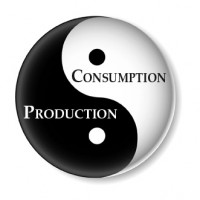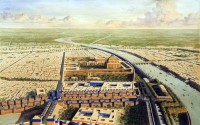Production and Consumption: The Yin and Yang of an Economy
The problem with current U.S. economic models is that they focus on consumption. This model is reflected not only in many recent economic “stimulus” plans like auto and appliance rebates, subsidized home mortgages, and government jobs programs, but it is embedded in a U.S. tax structure that deters production in the U.S. and stimulates U.S. companies to produce many products oversees. Implicit in this tax structure is the idea that the United States is a consumer society and that we can endlessly consume without producing enough to pay for it.
Does Consumption Drive Production or Production Drive Consumption?
In reality they both drive one another, but production takes the first step. It is known, for example, the cities with more heart surgeons have more heart surgeries per capita. Supply creates demand. Without surplus goods or services to offer, people might not even know they existed. On the other hand, the lack of something you would like to have causes invention of new goods and services, so from that standpoint consumption drives production. Thus, an economy contains a reciprocal give and take process, roughly outlined by Adam Smith in the argument that you need to produce something above what you consume yourself and offer it for sale to create a profit from which you can buy of the surplus of other producers. By being a producer, one is able to become a consumer.
A limited number of human beings can be consumers without producing anything. We can be hunter-gatherers or pull fish from the seas, living off the bounty of the natural world. But human consumption without production is limited to what the natural world produces of its own accord. The relationship of the human population to the natural world would thus be restricted to the amount of food and resources available for the taking from the natural world. This form of consumption can be compared to maggots feeding on a carcass. When the carcass is fresh the maggot population will grow, and when it is consumed, the population will die off or find other carcasses.
The Rise of Human Civilization — Non-Malthusian Society
The development of agriculture led to the possibility of non-Malthusian societies that are sustainable over long periods of time. In such societies human consumption is supported by human production that exceeds that of the natural world. Agriculture that produces more food than found wild is considered the basis of civilizations that support larger populations and allows for the division of labor into technical, military, and other fields of work. The agricultural developments in the Fertile Crescent are often considered the basis for modern civilization. The irrigation provided in Nile Valley in Egypt, the Indus Valley in India, and the Huang He (Yellow) and Yangtze allowed other great civilizations to develop.
Despite all the developments of literature, science and technology in modern civilization, at the foundation is a system in which production keeps pace with consumption. The United States began as a nation of family farms and shops, in which about 65 percent of the population was engaged in small sustainable family farms. This could be called a simple society where most people were self-sustainable.
Advances in technology, like the invention of the tractor, combine, and artificial fertilizers made it possible to grow more food with a smaller percentage of the population. By the late 20th century, less than 3 percent of the population was required to grow all of the food necessary for its 300 million people. However, the 97 percent that do not grow food much engage in other productive activities that produce other products or services that people want or need, or they will not have any money to trade for food. Such societies are complex societies and required a system of distribution of labor in various productive enterprises.
Like the difference between a single celled organism and a human body, complex societies contain many social organs that simple agrarian do not need. Factories, schools, governments, churches, and NGOs are all possible because of the ability of the agricultural sector to feed all of them. The economic system and money supply is like the blood that flows throughout the body from one organ to the next enabling them all to live. Ideally, the government is like the central nervous system that regulates the entire system though a system of feedback. It needs to be a system that makes sure that there is enough production to fuel the consumption of the cells in the entire body.
The role of a good government is to protect a society from aberrant behavior that destroys the production/consumption balance.
- First, a government has to protect all of the productive individuals in a society from theft. This means creation of rule of law that protects private property and security of borders against invasion.
- Second, a government has to ensure that the productive individuals are not overtaxed or they will not be able to produce. Or, they may move to another country where they will fare better.
- Third a government has to ensure that the civil society is raising productive members of society, capable of production of useful goods and services, and guards against the development of non-producing members of society, who, like cancer cells, still consume but perform no useful service.
- Fourth, the system should be designed so that, over a lifespan, each individual produces more than they consume, so that each will contribute to a future world better than they found it.
- Fifth, the system should be based on each individual’s pursuit of happiness as the driving force, coordinating individual happiness with social stability and peace.
In theory, civilizations should be able to move from agricultural, to industrial, to leisure so long as everyone in the society is playing a productive role–even if it is manicuring a golf course. In the first phase, food is harnessed so that only a few percent of the population is required for that. In the second phase, industry is harnessed so that only a few percent of the people are required for the manufacture of basic goods enough for all. In the third phase, health, leisure, and recreational facilities are developed with a few percent of the people working in those fields.
In practice, civilizations have declined before becoming leisure societies because some individuals consolidate power or wealth in ways that prevent others from even pursuing a basic agrarian existence, effectively discarding them, cutting them off, or turning them into refugees.
The Decline of Civilizations–Consumption Outstrips Production
The decline of civilization, or the breakdown of the system occurs when greed and selfishness rule—when individuals desire to consume but not produce. This is what Hobbes called “the state of nature,” which is also a state of war. Selfish individuals, like maggots on a carcass, want to consume without producing. Such individuals in a human society might also be equated with cancer in the human body since cancer cells consume and grow an aberrant mass unrelated to the function of the body itself and kill the cells adjacent.
This occurs when government fails to perform its role of protection and regulation:
- This may occur if the military is incapable of defending the society from being overrun by an enemy.
- It may happen when too many individuals in the society attempt to consume more than they produce.
- It may happen when individuals, or entire social organs (corporations, government agencies, other interest groups), attempt to manipulate the government to redirect funds from productive sectors to themselves, causing consumption to outstrip production.
- It may happen when governments borrow or print money as a false substitute for production, which causes inflation, causing consumption to outstrip production.
- It may happen when parents, churches, and schools fail to create people capable or willing to produce more than they consume.
- It may happen when too many individuals, over their lifetime, consume more than they produce, for example drawing more social security than they put in.
- It may happen when individuals are not motivated to achieve their own happiness, but are oppressed, as slaves, working for someone else’s happiness.
All of the above reflect the dominance of “the state of nature” over an acceptable social contract. They degenerate into a state of war within states, whether this be tribes like the Hutus and Tutsis in Rwanda, fighting over the instruments of the state power or political parties like the Republicans and Democrats in the United States today. In both cases, those contesting for power are seeking to control resources for themselves at the expense of those in the other groups. In such cases, consumption through plunder rather than as a result of surplus production, is the strategy. In the United States there is a growing backlash in the middle class, which has now become lower-middle class, as big government and big industries have fed off of the work and live savings of hundreds of millions of willing United States citizen-producers who have been overtaxed, marginalized, and find themselves highly skilled but unemployed.
The Rise of China and the Decline of the United States
A basic understanding of the social and economic principles that underlie the rise and fall of civilizations makes it easy to understand why China is Rising and the United States is in decline. China, after throwing off imperialism, and then communism, sought to decentralize power and return to a market system, rewarding production. The United States, after generations of production, has turned into a society of consumption and, ironically, given much of the production to China. China is increasing production and moving to a healthier yin/yang economy. The United States is increasingly adopting a consumer (maggot) mentality.
There are those that argue that this is an “equalizing trend.” I would argue, however, that each society in a global community has to be able to produce more than it consumes, just as each individual in a rising society needs to produce more than he consumes.
Fixing the United States
The United States has started its decline because the government, the social organ that is supposed to regulate society the way the brain and the central nervous system regulate a human body, has become cancerous. As a result it has become a consumer without being a contributor to the overall health of the body. It has let corporations run uncontrolled, welfare run uncontrolled, and encouraged plunder from other nations through military exploits. This has to be stopped or the fate of the citizens of the United States will be like the fate of maggots when the carcass left of the healthy body our ancestors nourished is consumed.
 I wrote Life, Liberty, and the Pursuit of Happiness, Version 4.0 to explain ways in which the U.S. decline can be reversed and health restored to the system. It lays out the basic principles of good governance and suggests ways to restore them in the United States. Whether these principles get applied in the United States is another question that is up to its citizens to decide.
I wrote Life, Liberty, and the Pursuit of Happiness, Version 4.0 to explain ways in which the U.S. decline can be reversed and health restored to the system. It lays out the basic principles of good governance and suggests ways to restore them in the United States. Whether these principles get applied in the United States is another question that is up to its citizens to decide.







Gordon,
Your fundamental thesis that the problems facing the US, and the European economies for that matter, arise because we are consuming more than we are producing is correct.
A nation, like an individual, that consumes more than it produces must pay for the difference by depleting its wealth. In times gone by, gold would have been transferred from one country’s vaults to another. With todays sophisticated global financial systems and capital flows, we have a host of more convoluted mechanisms to accomplish the same end.
It is not inevitable that wealth must shift from the West to the East. If Western economies were producing more and the Chinese yuan was allowed to appreciate, then the Chinese could still enjoy a rapid rise in their standard of living (through internal demand) without the continued transfer of wealth from the West. Perhaps one reason the Chinese are reluctant to do this is because they hold a huge amount of dollar-denominated debt. But with or without an appreciation of the yuan, pressures in their labour market are resulting in rapid wage rises and change in relative costs vis-a-vis the West. As costs in the East start to rise, then over time Western nations will have more opportunities to produce and sell their goods in the global marketplace.
Your conclusion that all societies should produce more than they consume, like your earlier assertion that supply creates demand, is questionable. When production exceeds consumption, the difference generally results in an increase in stocks of unsold goods.
My personal view is that if you were to refocus your attention on issues of inequality, both within and between nations, you would find a more fertile field to plough.
Gordon,
I agree with much of your analysis. I am especially pleased with your agriculture-industry-leisure sequence. Years ago I wrote books in the area of leisure studies, describing – and hoping – for such a Maslowian future, when man would self-actualize his higher needs, having satisfied his basic material needs. Alas, it doesn ‘t look like we are getting there (yet). I was being utopian. Instead, France, Germany, the US and others are raising the retirement age. So, it’s back to the grindstone, not to the leisure society – for now.
I agree with you that we have entered an era of decline, instead of a bright leisure future.
…And that it is due to the imbalance between production and consumption. And that we (and Europe) are going down, whereas China is on the right tract.
…And that this does NOT represent a desirable redistribution of wealth on a global scale, as the previous commentator seems to feel.
However, I am not sure that we can continue to blame “the government” for everything. “The government” is an abstraction. It is a reflection of us. Wasn’t it Thomas Jefferson who said that the people get the government they deserve? And Pogo who said that we have met the enemy, and it is us?
Like Rome’s decline, ours may be more cultural and psychological than structural….
that the pepole get the government they deserve? And Pogo who said that we have met the enemy, and it is us?Like Rome’s decline, ours may be more cultural and psychological than structural….
Tom,
Perhaps you read more into my comments than I intended. I certainly don’t recollect saying anything about excessive consumption in the West representing “a desirable redistribution of wealth on a global scale.”
All I said was that if you consume more than you produce, then in the end you have to pay for it by depleting your wealth. Surely, that’s axiomatic.
As to my concern about inequality between nations… I just happen to believe that economic development in poor countries is generally desirable and that the richer nations should do what they can to foster it. But that does NOT imply that I think economic decline in rich countries is also desirable. We are not talking about a zero-sum game here.
Since poorer economies in the earlier stages of industrialisation are capable of growing much faster than mature economies, ideally, a narrowing of GDP per capita among countries can occur naturally in an open and fair global economy. That’s the theory. Whether this will happen is a different question.
I appreciate your comments. You both help me to sharpen my ideas. Graham questioned whether a society should produce more than it consumes. It seems that producing exactly what you consume would be “sustainable,” but that producing more than you consume would allow an opportunity to address problems of on economic development and injustice. You could use surplus capital accumulated to help others who need help to develop their financial productivity, and to provide some welfare to those who for reasons of age or health cannot be income producers.
I think economic injustice is a better term than “inequality” because people are not equal, do not desire to be equal, and should be rich in diversity of life choices and talents. However, injustice is when someone gets rich off of someone else, or uses his position to hold another down. I agree this needs to be worked on, but having a just economy is secondary to having an economy suitable to create a just society; just like digging a well in a desert is prior to just distribution of water.
Hi gordon
what i find missing is the systems view. Most economics ignores the ecosystem in building its models. Most of those variables are dismissed as externalities. That is the current problem with the planet if one worries about sustainability, climate change, pollution wrt the environment, or the exploitation of humans in the developing world and build your model within the boundaries of the United States, for example. It is the principle reason for the break with neoclassical economics by the heterodox economists. Also, if you go over to your Values Knowledge Foundation website which is based on post modern thought, then you understand that static models based on classical newtonian mathematics which works for science and technology fails when the human element is mixed in creating a dynamic, open and far from equilibrium complex model.